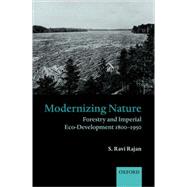Modernizing Nature Forestry and Imperial Eco-Development 1800-1950
, by Rajan, S. Ravi- ISBN: 9780199277964 | 0199277966
- Cover: Hardcover
- Copyright: 4/13/2006
Modernizing Nature contributes to the debate regarding the origins, institutionalization, and politics of the sciences and systems of knowledge underlying colonial frameworks of environmental management. It departs from the widely prevalent scholarly perspective that colonial science can be understood predominantly as a handmaiden of imperialism. Instead, it argues that the myriad "colonial" sciences had ideological and interventionist traditions distinct from each other and from the colonial bureaucracy and that these tensions better explain environmental politics and policy dilemmas in the post-colonial era. Professor Rajan argues that tropical forestry in the nineteenth century consisted of at least two distinct approaches towards nature, resource, and people; and what won out in the end was the Continental European forestry paradigm. Rajan also shows that science and scientists were relatively marginal until the First World War. It was the acute scientific and resource crisis felt during the War, along with the rise of experts and expertise in Britain during that period and the lobby-politics of an organized empire-wide scientific community, that resulted in resource management regimes such as forestry beginning to get serious state backing. Over time, considerable differences in approach and outlook towards policy emerged between different colonial scientific communities, such as foresters and agriculturists. These different colonial sciences represented different situated knowledges, with different visions of nature, people, and empire, and in different configurations of power. Finally Rajan demonstrates that the hegemony produced by these state-scientific regimes of resource-management during the period 1950-1990 produced not just social revolt, as recent historical work has demonstrated, but also intellectual protest. Consequently, the discipline of forestry became systematically re-conceptualized, with new approaches to sylviculture, economics, law, and crucially, with new visions of modernity. This disciplinary change constitutes nothing short of a cognitive revolution, one that has been brought about by a clearly articulated political perspective on the orientation of the discipline of forestry by its practitioners.






